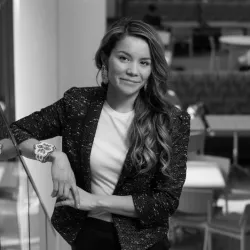Reconciliation is a journey, not a destination
To mark this 2023 National Day of Truth and Reconciliation, we are republishing this magnificent text (originally published June 20, 2022).
An elder once told me, the strength of who we are as Indigneous people comes from the fact that we speak from the heart, and that for thousands of years we’ve passed down our traditional knowledge, history, and cultures through our stories.
As a Dene woman born in Northern Saskatchewan, most of my early memories were of days spent on fishing boats in the north. It was on the vast freshwater lakes of northern Saskatchewan where my dad taught me how to fish, filet fish, and you guessed it, find the best fishing spots (and keep them secret).
My dad was a single parent raising three young girls. At the age of 29 he made the difficult decision to become a single father. At the age of 30, he decided to pursue his lifelong dream of becoming an artist and a painter. My mother is a residential school survivor who never graduated high school, and spent all of her life in the north. From an early age, challenges like substance abuse to suicide were familar to my family.
As I grew older and became aware of these disparities, I made it my life's mission to make a difference for Indigenous peoples around the world. At the age of 22 I became the first person in my family to graduate from University. At the age of 23 I co-founded a national Indigenous professional association, with the goal of creating a more diverse and inclusive workforce across Canada. Over the last decade, I’ve had the privilege of working with Indigenous leaders across Australia, New Zealand, Peru, Mexico, the United States, and Canada. While I haven’t known where each chapter would lead, I knew in my heart I wanted to make the world a more equitable place than the one I was born into.
As an elder once told me, “each day you’re creating footprints to follow. Make sure as you walk, that you walk in a good way.” I’ve been fortunate to follow in the footsteps created by Indigneous leaders such as Dr. Marie Battiste and Lorna Williams. For me the path of reconciliation is a lifelong journey, each day, each step a reminder of the responsibility we have for the generation that follows.
My reconciliation journey is lifelong. It involves learning my language, on Dene land, and deepening relationships among kinship networks and healing intergenerational trauma. As we begin the United Nations Decade of Indigenous Languages, it feels like there is increased awareness and understanding towards the importance of these issues. My hope is to translate momentum into action.
For me National Indigenous History Month is an opportunity to reflect and celebrate. My hope is Canadians from coast to coast to coast use this month to understand their shared responsibility in reconciliation. Use the time to reflect on the land they settled on and learn about the original caretakers of the land. As Canadians reflect on their shared responsibility in reconciliation, I ask them to remember the elders' wisdom and reflect on their own journey. What footprints are they creating? How can they walk in a good way?


